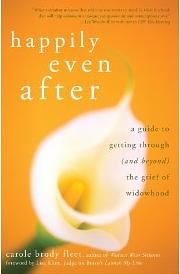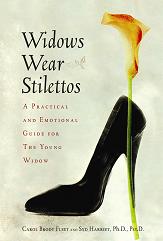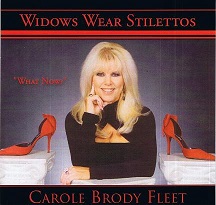Be it biblical or folk; fictional or popular, history in all of its forms has certainly had its share of classic struggles and conflicts: David vs. Goliath; the Hatfields vs. McCoys; Billie Jean King vs. Bobby Riggs; the Beatles vs. the Rolling Stones; Ginger vs. MaryAnn; the Dallas Cowboys vs. Just About Any Other Team In The NFL and of course, My Hair vs. Humidity.
Today, we look at yet another epic "struggle" and conflict with which countless have taken serious issue:
Death vs. Divorce
Many in the widowed community have encountered people who have made comments to the effect of, "I know how you feel; I'm divorced". Frankly speaking, many of those widowed have also been nearly overcome with the desire to hit these people in the head.
A few months ago, two widows shared their own stories of Death vs. Divorce. One widow was told by a divorced acquaintance that she was "lucky to have a fresh start". Another heard, "You're lucky your husband died; at least you'll never have to see him again".
Can you imagine?
Perhaps you can.
Let's first examine facts. First, a divorced person is generally dealing with some kind of animosity (whether they initiated the divorce or not) and may likely prefer not ever having to see or hear from their ex-spouse again (which explains a widowed being told how "lucky" they are to actually be widowed). Secondly -- and commonly -- those who have endured a divorce do see themselves as having endured a "death" of sorts...the "death" of a marriage; the "death" of the promise of a future and the "death" of a life once shared -- and they further see these metaphorical deaths as the great common denominator and equalizer with the widowed.
While anyone with a heart naturally sympathizes with those who have or are enduring the pain of divorce (having been down that road myself prior to marrying my late husband), it remains that in a divorce situation, somebody somewhere made a choice to leave the marriage. The same cannot be said for the widowed. Widowed's marriages ended through and by no one's choosing **. These marriages ended by sudden or lengthy Illness, accident, tragedy or other unforeseen circumstances - not because of somebody's choice.
So how can anyone realistically compare divorce to widowhood?
The answer is simple -- the divorced are comparing the "deaths" that they have experienced to the losses that widowed have endured. Moreover and just as the widowed often do, divorcees too are likely suffering through pain, anger, bitterness, feelings of abandonment, possible financial challenges and an uncertain future. They then automatically assume that they can directly relate to the widowed's feelings...and it is up to the widowed to gently correct them. Note the emphasis on the words "gently".
(Unless they say something utterly ridiculous, like the divorcee who once said to a widow, "I wish my husband would drop dead too." Or how about, "Being a widow is much easier than divorce; at least you know where your husband is". Then you have my blessing to throw "gently" out the window).
About three years ago, I heard from a woman whose husband was divorcing her after leaving her for a much younger woman. This poor woman badly needed someone to talk to and one can only imagine the pain and the betrayal that she must have felt. However, posting on a message board intended specifically for the widowed community and telling other widowed that she knew what they were going through because she had been left for a younger woman was perhaps not her wisest choice. Predictably, this woman's post resulted in a number of unfortunate rebuttal comments made by widows, until one widow posted a wonderful reply:
"While your feelings of loss are valid, divorce is not the same as being widowed. I had an acquaintance make the same analogy regarding her husband leaving her for another woman. I let her know [that] I did not appreciate the comparison. I am not dismissing your feelings of loss and I do feel terrible for you [but] please do not assume [that] being widowed is similar. It would be good for you to join a divorce support group which could really help you".
This insightful widow did a fantastic job of educating our divorced friend by gently letting her know that while no one is dismissive or uncaring of how she rightfully feels; she should nonetheless realize that the loss of a spouse is not the same as a divorce from a spouse. The losses are separate, distinct... and incomparable.
While you may never understand anyone making the sort of comments that were made to these widows (because I certainly don't), it is nonetheless up to the widowed as a community to let the divorced know that while we appreciate the fact that they too have suffered a heart-crushing loss and that we are absolutely sympathetic to that loss, the metaphorical deaths that accompany divorce cannot be compared on any level to actual spousal death. The widowed should feel free to correct anyone who is trying to draw comparisons between divorce and loss -- not by playing a game of "My Pain Is Worse Than Your Pain", but by gently stating that death is simply not the same as divorce; that you are not "lucky" to have lost your spouse or "lucky" to have a "fresh start" or "lucky" in any way, shape or form. While each life-altering in their own right, death and divorce cannot and should not ever be compared.
**Those who are suicide survivors, please note: I fervently believe that your loved one did not "choose" to leave; although the death may have been by their own hand. Generally speaking, a suicide victim sees no other way out of their own personal pain. In other words, it's not that they wanted to leave... they felt that there was no way to stay.



Carole's latest book, "Happily Even After..." is the winner of the prestigious Books for a Better Life Award. For more information about Carole Brody Fleet and Widows Wear Stilettos, please visit www.widowswearstilettos.com
Follow on Facebook at Widows Wear Stilettos
Follow on Twitter: @WidowsStilettos
